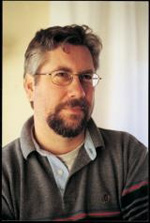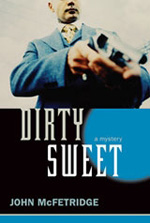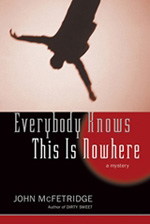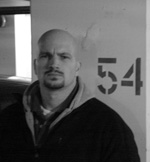- Welcome
- Noir Zine
- Allan Guthrie
- Books
"...those who enjoy the darker side of the genre are in for some serious thrills with this..."
Laura Wilson, The Guardian

Published in the UK by Polygon (March 19th, '09) and in the US by Houghton Mifflin Harcourt (Nov '09).
John Mcfetridge
interviewed by Mike Knowles

Mike Knowles: The papers have called you Canada’s Elmore Leonard. How does that comparison make you feel?
John McFetridge: Great. Elmore Leonard has spent forty-some books and dozens of short stories and screenplays developing his craft and I get to learn from that. Maybe forty books from now my writing won’t seem so influenced by Elmore, we’ll see. But it is funny to me, sometimes. Before I had a crime novel published I co-wrote a book of connected short stories called Below the Line with Scott Albert. My prose is almost exactly the same in that book as in my other novels, but no one mentioned any Elmore Leonard comparisons, I guess because it wasn’t a crime novel.
But I’ve been influenced by a lot of other writers, some the same ones Elmore Leonard was, Hemingway and George V. Higgins and I also read a lot of newspapers growing up, especially sports columnists. And I do try and get the voices of people I’ve actually met into the books.
MK: Why set your books in Canada? Most people in the world think we’re all touque wearing igloo builders with puck bunnies for wives. Why not pick somewhere more universally appealing?
JM: One day in late August, when we first married, my wife was making plans for a Saturday night in November and I said I’d be watching the hockey game. She said, “How do you know they’ll even be a game on that day?” I’d never known anyone who grew up in Canada and didn’t know that Hockey Night in Canada was on every Saturday. This country is sure changing.
Setting was never even a question for me. This is the only country I know and I’m not well travelled at all. I found the whole idea of writing a book intimidating enough, I couldn’t imagine trying to set it someplace I didn’t know well. I think of the setting as another character – Toronto has a personality and it’s been quite a while since it was, “Toronto the good.” There can be a desperate striving in Toronto, a sucking up to more established cities that drives me crazy. It also makes for good material.
MK: How much of your work is based on reality and how much just comes from inside your head?
JM: I’m going to say 50-50 but there are elements of people I’ve known in almost every character in the books. The basic idea for Vince in Dirty Sweet came when I was thinking about how different my life would have been if I’d gone to jail when I got arrested in Calgary for robbing the Sears store I was working in as a janitor (nothing like a suspended sentence) – and if I’d been a very cool guy instead of me. A lot of the crimes in the books are real crimes I’ve read about (or people told me about), but I put in my characters and connect them up to fit my stories.
My brother just retired from 39 years as an RCMP officer – most of that in narcotics - and a few of my cousins have done serious jail time. In what I call my “previous life,” I became a father at 19 and my “uncle-in-law” is in the book The Canadian Connection about organized crime in Montreal – he was low level guy involved in the French Connection heroin smuggling ring and was in prison when I knew him. He told some interesting stories home on his Christmas pass (if you get the chance, apparently Corsicans are good guys to buy heroin from). I guess I needed some distance, it still feels a little mercenary, but now I do look at the whole world as material.
MK: Did you start off writing fiction?
JM: I wrote unsuccessfully for a long, long time. In my last year of high school my friend Randy McIlwaine and I wrote a screenplay (not surprisingly a high school comedy – this was just before Meatballs, the late 70’s) and had some producers interested. Of course, like 99% of movies it went nowhere. But I kept writing, trying more screenplays and ‘literary’ short stories, which were usually set at whatever blue collar job I was working at the time. After my wife Laurie and I got married we moved to Toronto and I worked on movie crews and kept trying to write screenplays. No one who really wants to write should ever get involved with screenplays until they’ve got a little something going with “real writing” – it just destroys your soul. Then Scott convinced me to write Below the Line and I got back into writing prose.
Then Laurie and I had a baby and I became a stay at home Dad. I started to write Dirty Sweet, but I wanted to make some money and I didn’t think anyone would be interested in an ensemble crime story set in Toronto that wasn’t really a mystery and wasn’t very literary, so that seemed to mean non-fiction. I found a publisher in Toronto that put out a lot of pop culture books – stuff about Buffy the Vampire Slayer and biographies of Deep Purple, stuff like that. So I pitched them on a book about Law and Order; it was going to be the true stories behind the episodes. They liked the idea and asked me to write one as a sample.

Six months later the editor who commissioned the L&O book came back from maternity leave and called me up asking for it. I told her I just had to get a crime novel out of my system but that was done so I’d get right to it. Then Jack David, the publisher at ECW asked to see the crime novel and I never did finish the L&O book.
MK: Both Dirty Sweet and Everybody Knows This Is Nowhere involve strong women on the wrong side of the law. What is it about these type of characters that keeps you coming back for more? Is it an ode to the badass chick in high school who wore the really red lipstick and motorcycle jacket (even though she took the bus home)?
JM: Her name was Bonnie and made me think of Bonnie and Clyde.
I don’t know how common it is, but I have known a few women dope dealers. Back in my “previous life” I knew a few other teenagers with kids and I guess dealing dope is a good job with flexible hours you can do from home.
But even though the female characters like Roxanne and Sharon (and Sunitha in Swap, and keep an eye on Danny Mac’s wife, Gayle) are strong, they also understand the hierarchy they have to survive in. They know they aren’t treated as equal, they never will be, there’s no Human Rights Commission in organized crime. So that makes them, to me, interesting characters with a lot going on. You know how people always say screenwriters were more creative during the Production Code days when there was so much they couldn’t come right out and say? Well, in some ways that’s what these female characters are going through, if they have any ambition or any desire to be independent at all they have to be smarter and more creative and strong.
MK: In your second book, Everybody Knows This Is Nowhere, you delve further into the personal and political lives of the police officers. In a crime novel with so many cool and diverse underworld characters, what made you go in that direction?

MK: One reviewer said, “It’s refreshingly hard to tell the good from the no-good in this helping of cops and robbers.” Do you feel it’s accurate to say there are no white hats in your books? If so where did they go?
JM: Yeah, I’d say that’s fair, there are no white hats. I like characters who are professionals – on both sides of the law. It’s not personal. Maybe that’s a reaction to the movie cliche of making everything personal, I’m not sure.
I’m also interested in the circumstances that lead to crimes and criminal lives. The criminals in my books are really just businessmen exploiting a market – usually drugs. I’m not convinced that many people involved in the sale of drugs, especially marijuana, would be criminals if dope was legal. Sure, a few guys at the top would look for other ways to make as much money and not care if it’s legal or not, but all those women I knew selling weed wouldn’t go out and start armed robbery careers or something. They aren’t bad people, they’re just making their way.
MK: Music was something that was referenced heavily in your books. The titles of both books even have musical references. What is the connection between music and crime fiction for you? Do you have a soundtrack in mind when you start writing? If so what is the playlist for your next book?
JM: Yes, I have a soundtrack. The next one is early 80’s, keyboards coming on strong. Led Zeppelin’s last album, Van Halen’s Jump, Bowie’s Let’s Dance and all that Brit new romantics stuff. Any time there’s a change like that it leaves some people behind and that’s interesting. That’s what it was for Dirty Sweet, kind of the end of music by musicians trying anything and everything and the beginning of the corporatization of pop music – that mid-70’s shift from experimentation to arena rock. I think that’s reflected in the book a little, Vince goes from a kind of old west pioneer in the online porn business to being taken over by the corporate-like organized crime bikers.
Fuck, that sounds pretentious, doesn’t it? The next book I have coming out in 2009 is called Swap and for the first time I made up the musical reference. In the mid-80’s I was in a band in Montreal and I put them in the book playing a song called Swap. Because really, writing these books is about having some fun.
MK: You recently took a more guerrilla approach to going to the Bouchercon 2008 conference in Baltimore by deciding to drive down. What did you get out of the experience?
JM: A lot of fun. There’s been a lot of noise lately about trouble in the publishing world and book sales and all that crap and the road trip to Bouchercon reminded me we do this because we love it – writing and reading. There’s a pretty cool community of crime writers and readers out there.
Also, I got a meta-fiction short story I’m posting on blog – mixing fact and fiction.
MK: Canadian crime fiction often doesn’t often show up on the world’s radar due to rampant jealousy over our mastery of all ice related sports. What unique things are we bringing to the table? And why does the world fear our awesomeness?
JM: Our ice related sports involve weapons – even that curling broom could do some real damage. Maybe that’s why Irish crime fiction is so good these days, have you ever seen hurling?
We don’t always use it, but we have a great view of the world – we’re not quite American and we’re not European. A lot of Canadians are from all over the world.
MK: Any word on you moving from the page to the small screen?
JM: Yes, I’m very happy to be working on a new cop show in set in Toronto to be called The Bridge. What makes it so cool for me is that it’s based on the experiences of a guy named Craig Brommell who’s a very controversial guy. He was head of the police union and took on a lot of powerful people. The series is about protecting cops, getting cops out of trouble, and not always in the most, um, legal of ways. Which is good for me because there’s a fair amount of police corruption in my books so Craig and I may not agree on everything. There’s a good chance that could make for some good TV – and some drunken brawls, which would be good for a writer’s room.
MK: What are you working on now?
JM: A book called Tumbling Dice about a band from the early 80’s who get back together and play the casino circuit – and rob a few along the way.
Of course, the bikers from my previous books are also moving in on the casinos and the cops are always close by.
MK: What book do you think people should read that you are sure they have probably never heard of?
JM: The Friends of Eddie Coyle is a great book, probably one that people have heard of, though. A lot of good books have been published in the last few years. I don’t remember anything like this before. The classics are fine, but these days I like staying current.
***
copyright © Noir Originals, 2009

MIKE KNOWLES (right) studied writing at McMaster University before pursuing a career in education. He became an elementary teacher and currently teaches in Hamilton where he lives with his wife and dog. Darwin's Nightmare, his debut novel, is out now. Click here to read an extract.
